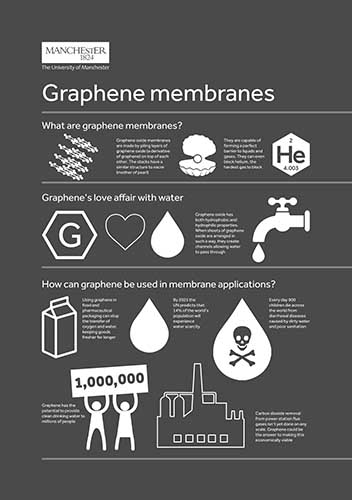
Graphene membranes
Imagine clean drinking water for millions in developing countries. The development of graphene-based membranes at The University of Manchester brings that possibility closer.
Graphene filtration
Graphene oxide membranes are capable of forming a perfect barrier when dealing with liquids and gasses. They can effectively separate organic solvent from water and remove water from a gas mixture to an exceptional level. They have even been proved to stop helium, the hardest gas to block.
Potential applications
The simplicity of the technique and the sophistication of the membranes developed at The University of Manchester means the scope for potential applications is widening quickly, while each day of research brings with it new ideas.
We are currently looking at how graphene membranes can be used for water filtration, gas separation and desalination projects.
Graphene coatings
A single layer of atoms that can act as a perfect barrier has the potential to open up vast new markets and revolutionise countless industrial processes.
Using graphene coatings on food and pharmaceutical packaging can stop the transfer of water and oxygen, keeping food and perishable goods fresher for longer. The removal of harmful carbon dioxide released into the atmosphere by power stations is not currently done on any scale, graphene membranes could change that.
Commercial partners
The University is working with a number of commercial partners, to turn research into viable commercial applications. To find out more about working with us, visit our partnerships section.
Partner with us
Graphene research and development
The University is dedicated the development of graphene membranes. If you are interested in collaborative opportunities take a look at our projects section.
Explore our projects


